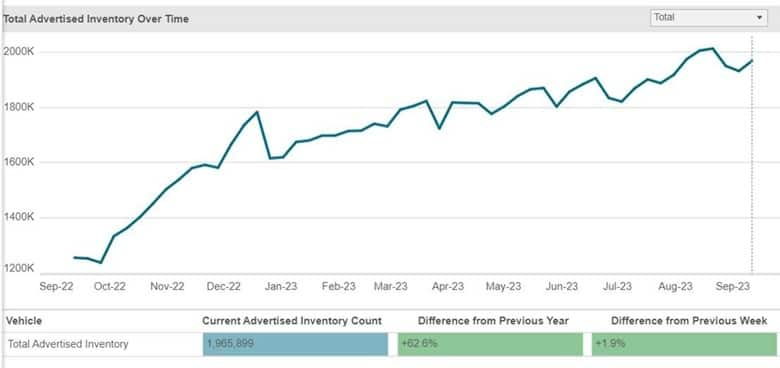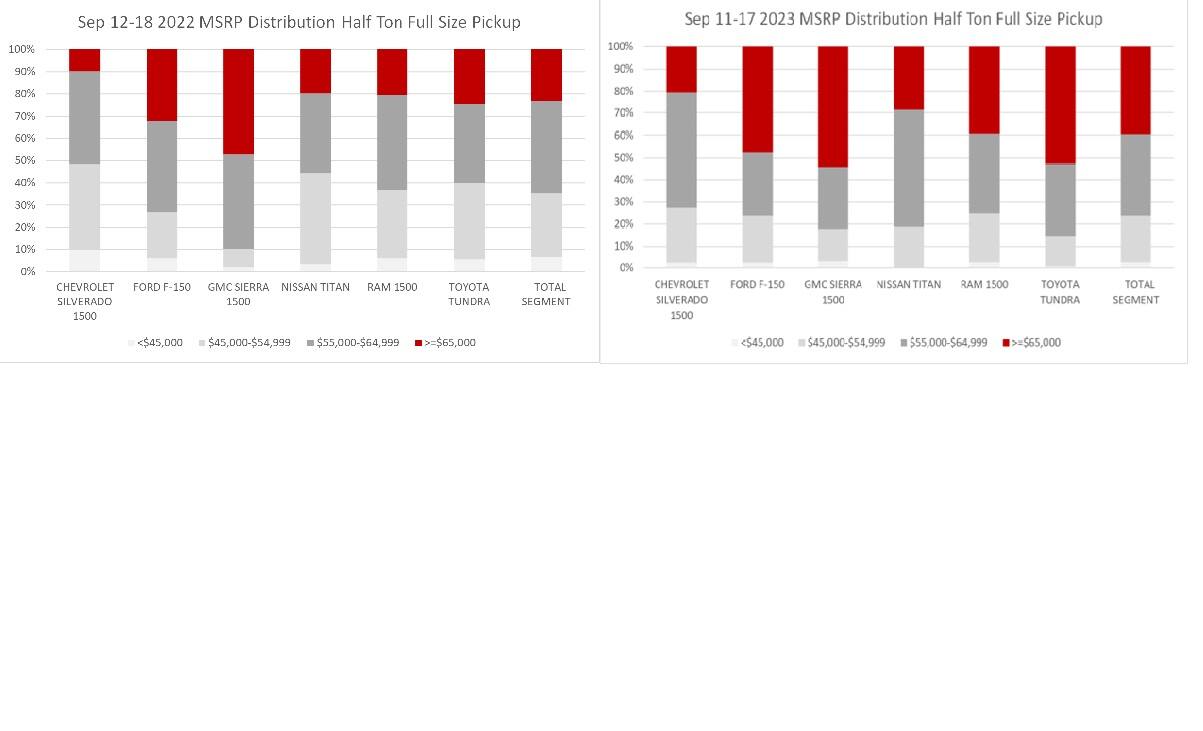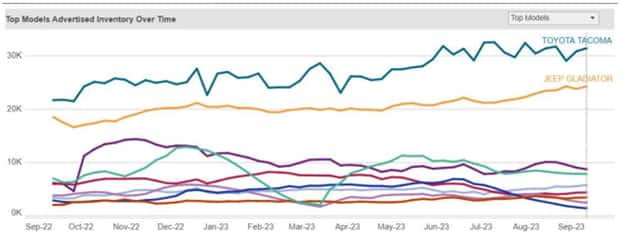September auto inventory trends

[ad_1]
Pulling from advertised dealer
inventory data through the week of Sept. 11, S&P Global
Mobility delivers the following insights:
The auto industry continues its year-long trend
of seeing inventories drop at month-end, then surge through the
first two weeks of the following month. The total advertised dealer
inventory count is slightly down from last month’s high and now
stands at 1.966 million units as of the end of the week of Sept. 11
— still representing a substantial increase since the beginning
of the year. If you smooth the peaks and valleys to a trend line,
it is a stable climb of about 50,000 units of increased inventory
per month – from 1.6 million as of the week of Dec 22, 2022.

Source: S&P Global Mobility Dealer
Advertised Inventory data, week of Sept. 11, 2023 ©2023 S&P
Global Mobility
Full-size pickup trucks have gotten
really expensive
Full-size pickup trucks have been America’s
workhorse for decades. But the pricing ladder in the past year has
swung this segment firmly into luxury-vehicle territory. According
to inventories, it’s nearly impossible to purchase a full-size
pickup for less than $55,000. In fact, the percentage of big trucks
priced above $55,000 has soared compared to this time last year.
Meanwhile, vehicles with MSRPs below $55k represented 35% of the
advertised inventory a year ago; now this is down to 24%.
A year ago, 65 percent of full-size pickups
were advertised above $55,000; as of the week of Sept. 11, that
figure jumped to 76 percent. In the case of the Toyota Tundra and
GMC Sierra 1500, more than half of all advertised inventory is
above $65,000. The Ford F-150 has not had such a dramatic decrease
on the low end (27% to 24%), but vehicles with MSRPs over $65k have
moved from 32% of their advertised inventory to 47%.

Source: S&P Global Mobility Dealer
Advertised Inventory data, week of Sept. 11, 2023 ©2023 S&P
Global Mobility
Mid-sized trucks and the UAW
strike
If the UAW continues to strike the three
mid-sized pickup truck plants, might consumers face shortages, and
might rivals pounce to gain market share?
Here are the respective advertised inventories
as of the end of the week of Sept. 11, along with their most recent
quarterly sales figures.
INVENTORY* 2Q 2023 SALES
Jeep Gladiator 24,249 13,751
Chevrolet Colorado 7,835 19,190
GMC Canyon 2,407 6,708
Ford Ranger 1,358 12,6
Ford Maverick 3,386 21,021
* As of the end of the week of Sept. 11,
2023
Source: S&P Global Mobility Dealer
Advertised Inventory data ©2023 S&P Global Mobility
These numbers above, however, represent
advertised dealer inventory. Witnesses have seen parking lots near
the striking factories filled with finished (or possibly
unfinished) midsize trucks that might not yet be listed in dealer
inventories.
As for rivals to the Ford, GM, and Stellantis
mid-size trucks, the Toyota Tacoma has the most inventory, at about
31,000 units. But that doesn’t necessarily reflect a large days’
supply; Toyota sold 63,262 units in the second quarter. And while
Hyundai Santa Cruz dealer advertised inventories have doubled since
this time last year, to 5,755 units, Hyundai sold 10,753 units in
2Q 2023. Similar quick-to-turn ratios exist for the Honda Ridgeline
and Nissan Frontier. The possibility of conquesting share from the
legacy domestic brands appears incremental at best – especially if
the strike plants come back online soon.
MIDSIZE PICKUP TRUCK
INVENTORIES

Source: S&P Global Mobility Dealer
Advertised Inventory data, week of Sept. 11, 2023 ©2023 S&P
Global Mobility
Luxury brands managing the ’23
selldown
Moving outgoing model-year vehicles off the
showroom floor is a challenge for premium brands. Nothing says
luxury less than distressed merchandise. Overall, the luxury
segment is managing the 2023 model year selldown pretty well, from
305,000 units in mid-July down to 275,000 in mid-September.
To be sure, the Japanese luxury brands often
begin turning over their model year in October, so they still have
some time. However, Lexus’ 2023 dealer advertised inventory
increased in September.
Among the European brands, Audi engineered a
summer selldown of Q5 crossovers, giving it the largest inventory
decrease in the luxury segment – essentially the same unit count as
Lexus as of the week of Sept. 11. The brand with the most leftover
2023s — Mercedes-Benz — is seeing numbers come down
slightly. But the brand also had a spring launch of the big-selling
2024 model year GLC crossover, which might skew the ’23 to ’24
ratio. Volvo saw a summer spike in 2023 model availability, and has
managed to sell off a chunk of that number, but still has more ’23s
in inventory now than in mid-June.
REMAINING 2023 MODEL YEAR INVENTORIES
— LUXURY

Source: S&P Global Mobility Dealer
Advertised Inventory data, week of Sept. 11, 2023 ©2023 S&P
Global Mobility
Mainstream brand inventories tell
differing stories
Among mainstream brands, every OEM seems to
have a different resolution to sell down their 2023 inventory.
Overall, incoming stocks of 2024 models are
ramping up faster than the 2023s are selling down. Chevrolet
dealers are already advertising more 2024s than 23s. And Ram’s ’23
selldown is on pace with its ’24 ramp-up. However, the Ford brand
is at a new high for 2023 models in dealer stocks as of the week of
Sept. 11, and has hardly any 2024 models listed.
Toyota has faced a limited days’ supply of
inventories on many products, and their 2023 stocks have decreased
promptly over the past six weeks as dealers wait for 2024s.
Meanwhile, Honda has been well into supplying 2024 model year
vehicles since mid-late June – mostly due to the spring arrivals of
the 2024 CR-V and Accord.
REMAINING 2023 MODEL YEAR INVENTORIES
— MAINSTREAM

Source: S&P Global Mobility Dealer
Advertised Inventory data, week of Sept. 11, 2023 ©2023 S&P
Global Mobility
LIGHT VEHICLE SALES FORECASTING
THE AUTO INDUSTRY SHARE
WARS WILL RESUME IN ’23
SUBSCRIBE TO OUR TOP 10
INDUSTRY TRENDS NEWSLETTER
AVERAGE VEHICLE AGE
REACHES RECORD 12.5 YEARS
LOWER-CREDIT BUYERS
PUSHED OUT OF NEW VEHICLES
This article was published by S&P Global Mobility and not by S&P Global Ratings, which is a separately managed division of S&P Global.
[ad_2]